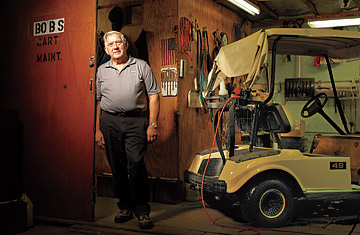
Robert Shively, 68, worked in a chemical plant for 36 years, but that didn't earn him an easy retirement.
(4 of 8)
High interest rates in the inflationary 1970s produced solid returns for Oxy's bond-heavy pension fund--so much so that Oxy's accountants figured the plan was overfunded by $600 million. For Oxy to get at that cash, pension laws required it to close its fund and start again. It did so with a far cheaper option: the employee-funded 401(k). The company made it clear that with the high interest rates at the time, Oxy employees could see their 401(k) account balances soar with little risk. Few doubted it--Oxy, like most other big companies of that era, had always taken care of its own.
At first, Occidental's union workers were not allowed into the plan. So when Ernie Lucantonio was offered a supervisor job in the fire-retardant division at Occidental, part of the reason he took it was to get into the 401(k). "The 401(k) forced you to save money, because you couldn't touch it," says Lucantonio. "I was making good money, but I wasn't saving anything. I had three kids going to college. So the 401(k) forced me to save, which I needed."
After 34 years, he left Oxy in 2005. Lucantonio, 61, is proud of what he has been able to afford in retirement. He and his wife bought a cabin in New York's hilly Southern Tier. "It's even got ceramic tile in the kitchen," he says. He would like to spend more time there, but like many other former Occidental employees we talked to, he's had to unretire into a new job. He is a real estate agent.
If Occidental had stuck with its pension plan, Lucantonio might not have to work. When he retired, he had a salary of nearly $80,000. That means he would have received a pension check of about $3,100 a month. It would be nice if 401(k)s could produce a guaranteed check as pensions do. But most 401(k)s don't generate enough income, and Lucantonio's is no different. He retired from Occidental with $350,000 in his 401(k). That's a hefty sum, but he can withdraw just 4% of it annually, or about $1,200 a month, to limit the chances of outliving his money. That's 60% less than what the traditional pension would have paid him.
Dennis O'Neil plays the part of a former HR executive well. You can find O'Neil, who left Oxy on disability a few years ago, on a golf course, clad in picture-perfect golden-years attire: a black Izod shirt with white shorts, faux-alligator-skin cleats, Ray-Bans, a gold shamrock hanging from a gold chain on his neck and a black baseball cap. But O'Neil's retirement outlook is growing darker every day. He once made a six-figure salary, but the 63-year-old is fairly certain that his savings won't be able to sustain him for very much longer. He has some $500,000 left in his 401(k) and spends about $75,000 a year. At this rate, he worries he will tap out his retirement savings within the next decade.
Unless, as O'Neil's thinking goes, he can make something happen in the stock market. So he spends much of his day watching CNBC. "Right now, I want to know which area of the economy is going to recover first. Will it be retail? Commodities? Energy?" says O'Neil. Playing the market is probably the wrong thing to do (see page 35), but he got divorced eight years ago, depleting a good portion of his savings, and his medical bills are likely to go up soon. O'Neil is going blind from histoplasmosis. These days he has to golf with a friend. He would like to buy a house in Florida before he loses his eyesight completely, but he just can't afford it.
